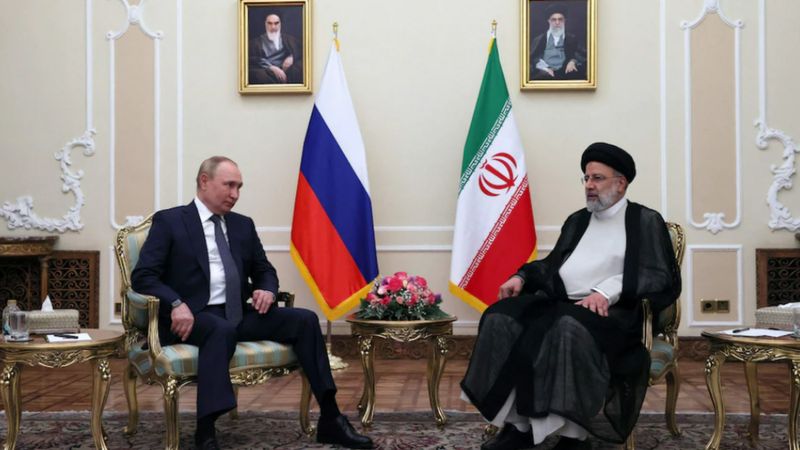On November 28, Mehdi Farahi, the Deputy Minister of Defense of Iran, announced the completion of arrangements to acquire new Russian military aircraft. These include “Sukhoi-35” fourth-generation++ fighters, “Mi-28” attack helicopters, and “Yak-130” training aircraft. While this move doesn’t mark a new direction in the military cooperation between Iran and Russia, it gains significance and momentum due to its timing, especially considering repeated statements by Iranian officials regarding the purchase of “Sukhoi-35” from Russia.
This announcement comes at a time of heightened tensions in the Middle East, driven by the ongoing Israeli war in Gaza, despite the extension of the ceasefire between Israel and Hamas. Additionally, it aligns with the deepening divide between Russia and Western countries over significant developments in Russian military operations within Ukraine.
Key Observations
However, three critical observations deserve consideration in this context:
Firstly, Iran declared the completion of procedures to finalize the deal, but Russia has not provided a clear response. This raises doubts about the seriousness of progressing to the deal’s ultimate stage. Nevertheless, Iran’s acceptance of two “Yak-130” training aircraft in early September suggests that both parties may be moving toward implementing measures in this agreement.
Secondly, the entity announcing the completion of the deal is the Iranian Ministry of Defense, not the Revolutionary Guard. This implies that the Iranian military, rather than the Revolutionary Guard, will be the recipient of the new fighter jets. This is likely to bring about a relative adjustment in the military power balance between the two, favoring the Revolutionary Guard, which maintains control over critical sectors such as missile and nuclear programs.
Thirdly, there has been no immediate and direct reaction from Western countries, which have consistently cautioned against military cooperation between Iran and Russia. While this could be tied to these countries, especially the United States, being preoccupied with developments in other arenas, such as the Gaza conflict and Russian operations in Ukraine, it does not rule out the possibility that these nations prefer to await confirmation or denial from Russia regarding these Iranian statements before taking a definitive stance.
Diverse Considerations
The deliberate announcement by Iran of this new step in military cooperation with Russia at this particular time can be interpreted in light of various considerations, with the most prominent being:
- Preparedness for a New Phase of Escalation with Israel: Despite Iran’s denial of involvement in “Operation Sword of Al-Quds,” conducted by the Al-Qassam Brigades, the military wing of Hamas, inside the Gaza Strip on October 7th of the previous year, it doesn’t rule out the possibility that, following the conclusion of the war in Gaza, Israel might escalate tensions with Iran. Israel still views Iran as the main supporter of Hamas and all factions and militias opposing Israel in the region.
Therefore, the announcement of this step serves as a preemptive message to Israel, indicating that Iran possesses capabilities that could assist in countering any escalation it might face. While Iran may not seek direct confrontation with Israel, it believes that accumulating and enhancing military capabilities strengthens its position against regional and international adversaries in the aftermath of the Gaza conflict.
- Capitalizing on the Easing of International Restrictions on Missile Development: The recent statements by the Iranian Deputy Minister of Defense come approximately forty days after the United Nations Security Council’s resolution, in accordance with Resolution 2231 and the nuclear agreement, to lift the embargo on activities related to Iran’s ballistic missile program. This resolution became effective after the lapse of eight years from the adoption date of the Joint Comprehensive Plan of Action (JCPOA).
In this context, Western nations are no longer dismissing the possibility that this development could set the stage for an enhanced level of military collaboration between Iran and Russia in the forthcoming phase. Iran might even consider seeking Russian missile support to manage its military operations in Ukraine, shifting away from the previous emphasis on unmanned aerial vehicles, such as the “Shahed 136” drone, as the focal point of military cooperation between the two parties.
The United States has responded to this strategic shift by cautioning both nations about the repercussions of this trajectory. White House spokesperson John Kirby remarked on November 21st that “the United States will closely monitor the situation between Iran and Russia and take appropriate action as necessary,” expressing concern that “Iran might be contemplating providing Russia with ballistic missiles for use in Ukraine.”
It appears evident that the broadening scope of military collaboration between Iran and Russia was the principal motivation behind Russian Defense Minister Sergei Shoigu’s visit to Tehran on September 19th of the preceding year. Multiple reports suggested that Iran extended an offer to the Russian Defense Minister, encompassing ballistic and tactical missile systems, as well as unmanned aerial vehicles.
- Anticipating Potential Changes in the Syrian Security Landscape: Tehran and Moscow acknowledge the potential for upcoming shifts in the security dynamics within Syria, potentially influenced by the repercussions of the Israeli conflict in the Gaza Strip. Russia’s response to the developments in that conflict, which notably garnered dissatisfaction from Israel, along with the recurrent attacks on U.S. bases in Syria by Iranian-backed militias, are factors that could trigger these transformations. Both nations recognize the necessity to expand their coordination and collaboration, especially at the military level, to mitigate any adverse consequences. The paramount importance of this matter for both countries underscores the urgency of such measures.
- Responding to Escalating Western Support for Ukraine: If realized, this potential deal may constitute part of Russia’s response to the growing support provided by Western nations to Ukraine, bolstering its ability to counter Russian military actions. Notably, the United States has sought to leverage the Israeli conflict in the Gaza Strip to offer additional support to Ukraine, as evidenced by the establishment of the “Ukraine-NATO Council,” designed to enhance collaboration until Ukraine completes its accession process into the alliance.
Consequently, Russia is currently seeking to strengthen its military collaboration with Iran, recognizing that doing so enhances its capacity to navigate confrontations with Western nations. The scope of disagreements between Western countries and Iran has significantly broadened, encompassing not only the nuclear agreement but also ballistic missile programs and regional roles. This is particularly evident in their influence over militias in countries facing crises.
In conclusion, if implemented, this step is expected to elicit robust reactions from Western nations. It represents a new factor likely to prompt these countries to offer increased support, at various levels, to both Israel and Ukraine, as both are directly targeted by Iran and Russia in their efforts to intensify bilateral military relations to such an extent.


